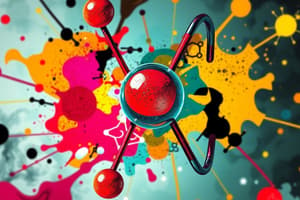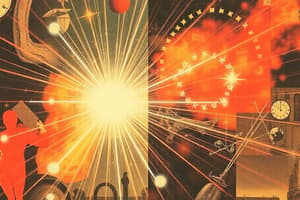Podcast
Questions and Answers
What was a significant change in the agricultural techniques during the period described?
What was a significant change in the agricultural techniques during the period described?
- Increased employment of human labor
- The adoption of sheep farming (correct)
- The use of sickles for harvesting
- The introduction of crop rotation
Which material was NOT mentioned as a product of the blast furnace?
Which material was NOT mentioned as a product of the blast furnace?
- Chains
- Gold (correct)
- Iron
- Steel
What crucial invention was developed for navigation during this period?
What crucial invention was developed for navigation during this period?
- Astrolabe
- Chronometer
- Mariner's compass (correct)
- Barometer
What factor contributed to the rise of factories during the Industrial Revolution?
What factor contributed to the rise of factories during the Industrial Revolution?
How did civil engineering impact transportation during this period?
How did civil engineering impact transportation during this period?
Which of the following was NOT a use for steel and iron mentioned?
Which of the following was NOT a use for steel and iron mentioned?
What invention replaced the sickle for cutting crops and grass?
What invention replaced the sickle for cutting crops and grass?
What role did Christopher Columbus play during this period?
What role did Christopher Columbus play during this period?
Who is known for discovering radioactivity in the 19th century?
Who is known for discovering radioactivity in the 19th century?
Which scientist is considered the 'Father of Taxonomy'?
Which scientist is considered the 'Father of Taxonomy'?
What did J.J. Thomson discover using Crookes' tube?
What did J.J. Thomson discover using Crookes' tube?
What theory is Jean-Baptiste de Lamarck known for?
What theory is Jean-Baptiste de Lamarck known for?
Which year was 'On the Origin of Species' by Charles Darwin published?
Which year was 'On the Origin of Species' by Charles Darwin published?
Who was responsible for the advancement of the telegraph system, along with Thomas Edison?
Who was responsible for the advancement of the telegraph system, along with Thomas Edison?
What concept did Charles Lyell propose?
What concept did Charles Lyell propose?
Which scientist is known as the 'Father of Railways'?
Which scientist is known as the 'Father of Railways'?
What discovery is William Roentgen famous for?
What discovery is William Roentgen famous for?
What significant law was established by Charles-Augustine de Coulomb?
What significant law was established by Charles-Augustine de Coulomb?
Who conducted crucial experiments on electromagnetic induction in 1831?
Who conducted crucial experiments on electromagnetic induction in 1831?
Which scientist is credited with the discovery of oxygen?
Which scientist is credited with the discovery of oxygen?
What did John Dalton's atomic theory primarily propose?
What did John Dalton's atomic theory primarily propose?
Which scientist formulated the theory of electromagnetic radiation?
Which scientist formulated the theory of electromagnetic radiation?
What did William Crookes discover in 1879?
What did William Crookes discover in 1879?
What does the Law of Conservation of Mass state?
What does the Law of Conservation of Mass state?
Who is credited with discovering the importance of carbon in steel in 1750?
Who is credited with discovering the importance of carbon in steel in 1750?
Which of these inventions was patented by Richard Arkwright?
Which of these inventions was patented by Richard Arkwright?
What type of machine did Samuel Crompton invent?
What type of machine did Samuel Crompton invent?
Which inventor perfected the steam engine to be more fuel-efficient?
Which inventor perfected the steam engine to be more fuel-efficient?
Which device did Eli Whitney invent that significantly impacted the cotton industry?
Which device did Eli Whitney invent that significantly impacted the cotton industry?
What year was the water frame patented by Richard Arkwright?
What year was the water frame patented by Richard Arkwright?
What was a significant advancement made by James Watt in 1765?
What was a significant advancement made by James Watt in 1765?
Which invention was developed specifically for mechanizing the sewing process?
Which invention was developed specifically for mechanizing the sewing process?
Which scientist is known for proposing the double helix model of DNA?
Which scientist is known for proposing the double helix model of DNA?
Who developed the first polio vaccine?
Who developed the first polio vaccine?
What was the significance of the rocket developed by Robert Goddard?
What was the significance of the rocket developed by Robert Goddard?
What was Sputnik known for?
What was Sputnik known for?
Which breakthrough in antibiotics did Alexander Fleming contribute to?
Which breakthrough in antibiotics did Alexander Fleming contribute to?
Which of the following scientists is associated with the quantum mechanics theory?
Which of the following scientists is associated with the quantum mechanics theory?
What major event occurred in 1961 related to space exploration?
What major event occurred in 1961 related to space exploration?
Who improved on Salk's polio vaccine by producing an oral version?
Who improved on Salk's polio vaccine by producing an oral version?
Flashcards are hidden until you start studying
Study Notes
Scientific Discoveries and Innovations
- Eugen Goldstein identified protons, positive particles from hydrogen gas tubes.
- Radioactive elements were discovered in the 19th century by various scientists.
- William Roentgen is credited with the discovery of X-rays.
- J.J. Thomson discovered the electron in 1897 using Crookes' tube within a magnetic field.
- Marie Curie and Pierre Curie advanced the study of radioactivity.
Communication Technology
- Alexander Graham Bell invented the telephone in 1876.
- Elisha Gray, Philip Reis, and Thomas Edison enhanced the telegraph system.
- Philip Reis created the "Make-and-break" telephone.
Taxonomy and Paleontology
- Carolus Linnaeus, known as the "Father of Taxonomy," developed binomial nomenclature and published "Species Plantarum" (1753).
- Georges Cuvier was a key figure in paleontology, advocating for the Theory of Catastrophism (1813).
- Charles Lyell proposed Uniformitarianism, suggesting gradual geological changes over time.
Evolutionary Theory
- Jean-Baptiste de Lamarck proposed the Theory of Acquired Characteristics.
- Charles Darwin's "On the Origin of Species" (1859) introduced Natural Selection.
- Gregor Mendel, as the "Father of Genetics," established foundational concepts of inheritance.
Industrial Advancements
- The Industrial Revolution began in the 18th century, marking a shift from agriculture to industry.
- Technologies such as the blast furnace enabled mass production of iron and steel, vital for tools and infrastructure.
- Innovations in textiles included the spinning jenny and power loom, which revolutionized fabric production.
Transportation Innovations
- Steam engine development, especially by James Watt, transformed transportation by powered engines, both for riverboats and railways.
- George Stephenson, called the "Father of Railways," created locomotion vehicles, including the Rocket, reaching speeds up to 30 mph.
Technological Innovations in Science
- Charles-Augustin de Coulomb made significant contributions to electrodynamics and formulated Coulomb's Law.
- Joseph Priestley and Antoine Lavoisier contributed to the discovery and naming of oxygen and established the Law of Conservation of Mass.
- John Dalton proposed the Atomic Theory in 1803, emphasizing atoms as fundamental particles.
Electromagnetism and Energy
- Hans Christian Oersted discovered the connection between electric current and magnetic fields.
- Michael Faraday conducted pioneering work on electromagnetic induction.
- James Clerk Maxwell developed theories linking light, magnetism, and electricity.
20th Century Scientific Breakthroughs
- Max Planck introduced quantum theory in 1900, while Albert Einstein's theory of relativity expanded physics in 1905.
- Robert Goddard achieved the first successful rocket launch.
- James Chadwick discovered the neutron within the atomic nucleus.
Genetics and Medicine
- Francis Crick and James Watson proposed the double helix structure of DNA.
- Alexander Fleming discovered penicillin, the first widely used antibiotic.
- Jonas Salk created the first polio vaccine, which was later improved by Albert Sabin.
Space Exploration
- In 1957, the Soviet Union launched Sputnik, the first artificial satellite.
- NASA led significant space missions, including the Apollo program, which landed humans on the moon in 1961.
Studying That Suits You
Use AI to generate personalized quizzes and flashcards to suit your learning preferences.




